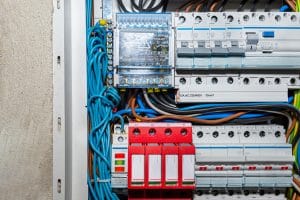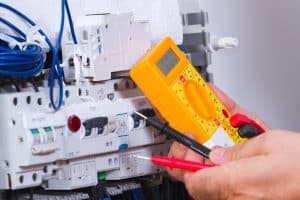Circuit breakers protect your home from electrical injury by de-energizing on overloads and short circuits, protecting against fire and saving appliances, particularly in older cities such as New Orleans. An understanding of their value promotes electrical safety in homes and businesses. Dissatisfied with your electrical services? Select Big Easy Electricians. Our qualified personnel value quality and safety for all your electrical needs. Don’t let electrical issues ruin your life—request a free appointment today and experience the Big Easy difference! Happiness is only a phone call away!
Circuit breakers are protective devices in electrical installations. Circuit breakers sense electric currents and cut off the supply automatically in the event of overloading or short circuiting, protecting wires and appliances and preventing potential fire hazards. While fuses have to be replaced if they blow, circuit breakers are reset, hence being more convenient and economical.
Circuit breakers are a requirement in domestic and commercial buildings with energy-intensive devices, eliminating overheating and destruction. Circuit breakers utilize thermal and magnetic protection devices and have evolved from manual to advanced thermal-magnetic and hydraulic technology. Smart breakers improve energy consumption efficiency and provide real-time observation, responding to the needs of the present towards safety.

Circuit breakers are safety devices that protect electrical circuits by switching off current automatically upon a fault. Circuit breakers are automatic switches that act extremely quickly on electrical imbalance to protect against overloads and short circuits, and protect your family and home. How quickly they can detect safe and dangerous currents is crucial to electrical systems of today.
Circuit breakers have internal sensors that monitor current flow. Magnetic sensors quickly detect sudden spikes in short circuits, and thermal sensors detect overheating from long-term overloads. This detects faults and minimizes unnecessary power outages. Newer circuit breakers also detect dangerous arcs and ground faults, making it safer at home and in the workplace.
A circuit breaker trips with devices such as bimetallic strips and solenoids when there is a fault. The bimetallic strip bends due to heat and opens the circuit, and the solenoid acts very fast when there are excess currents. It protects your household appliances and wires. Once you have corrected the fault, you can reset the breaker for additional safety.
Circuit breakers are made to detect safe and unsafe currents for specific load capacities. They allow normal current passage but protect against dangerous surges. For instance, a breaker of 20 amps will trigger if the current is above this amount, and this will prevent your appliances from shutting off unnecessarily.
Quick response times are essential to prevent fire, overheating, and damage to equipment. Modern breaker technologies are more sensitive and secure, enabling quick trips without unnecessary interruptions. This balance shields both the system and operators.
Circuit breakers are highly essential for electrical safety and come in numerous shapes and sizes for various functions. They avoid faults such as overloads, short circuits, ground faults, and arc faults. Safety, efficiency, and compliance with regulations must be taken into consideration when employing a circuit breaker, particularly in New Orleans. We learn the most common types of circuit breakers, their use, and their general uses.
Thermal magnetic circuit breakers offer protection against electrical faults through thermal and magnetic action. The thermal component uses a bimetallic strip that warps on prolonged overcurrent, and the magnetic component springs into action to short-circuit by producing a high magnetic field that causes tripping of the breaker. They are responsible for the protection of circuits in household and office use, including lighting, receptacles, and computer equipment. Their capacity to control both long overloads and short surges renders them a suitable option for electric protection.
Magnetic circuit breakers make use of electromagnetic force to sense and trip high-current faults, i.e., short circuits. When there is a fault, rising current energizes a magnetic coil, making the breaker open the circuit. Magnetic circuit breakers find applications in heavy-power-load industries such as manufacturing plants because they can protect against unexpected high-current faults. They avoid damage and downtime due to their fast response, guaranteeing continuity of operation.
Ground fault circuit interrupters (GFCIs) prevent shock by testing the current between the hot and neutral wires. They will shut off power immediately if they find an imbalance, like when a body is in contact. GFCIs are necessary in bathrooms, kitchens, laundry rooms, and outdoors where there is a greater threat of shock. GFCIs safeguard New Orleans residents and allow homeowners to keep their property in code compliance within the region, especially when it is humid, by sensing tiny leakage currents to avoid accidents near water.
Arc Fault Circuit Interrupters (AFCIs) are circuit breakers that cut off fires resulting from frayed wires. AFCIs can sense hazardous electrical arcs within a short time and cut off the power to reduce fire hazards. AFCIs need to be installed in older homes to protect kitchen, living room, and bedroom circuits. When AFCIs replace old wiring, life is made safer for homeowners and real estate, and they meet current safety standards.
Hydraulic magnetic circuit breakers are of utmost importance to defend the circuit, utilizing hydraulic fluid and magnetic power to detect faults. They are resistant to instantaneous tripping, even in harsh temperatures, and are thus most suitable for harsh environments like marine and industrial environments. They are typically used on sea ships and sea platforms in the Gulf of Mexico, but are utilized elsewhere too. They provide electrical safety. Their strength and accuracy offer acceptable performance, a tough requirement in electric danger control in hostile environments.
There are application-specific breakers, aside from universal circuit breakers. There are air circuit breakers in high-rise buildings and substations, and power stations use medium-voltage vacuum circuit breakers to avoid safety hazards and short circuits. These breakers are used to protect infrastructure and equipment from electrical accidents. In New Orleans, tourist, energy, and cultural industry businesses invest a significant amount of capital in these breakers to increase safety and protect their property, showing how crucial they are in the world of electricity today.

Circuit breakers play a crucial role in safeguarding against electrical danger in the home, business, and industry. Circuit breakers can sense faults and cut off power, which helps to prevent human beings, assets, and electrical equipment from being destroyed. Circuit breakers ensure protection and dependability by averting problems like overloads, short circuits, and electrical fires.
They protect against overheating by sensing and shutting off flows of excess current, which is important in residential areas such as New Orleans due to the fact that there exist weak, aging wires that lack the capacity to support the appliances currently used. In turning off electricity in overloaded circuits, they lessen the danger of fire and prevent the wearout of electrical machinery.
Short circuits due to faulty insulation or wiring can start hazardous fires. Circuit breakers avert this by snapping off the power in a split second, which reduces the risk of harm or damage. They would be much more likely to cause fire, system failure, and expensive repairs without circuit breakers.
Electrical fires are a major issue nationwide. Circuit breakers avoid the occurrence of such fires by tripping out dead circuits and interrupting heat accumulation. They are subject to stringent fire safety codes, thus remaining effective and crucial for safety devices.
Surges and spikes of voltage can destroy sensitive electronics. Circuit breakers guard them from this, saving repair costs and extending their lifespan. They require maintenance for maximum effectiveness.
Circuit breakers are a vital safety measure in electricity, avoiding short circuits and overloads to save people and machinery. Proper inspection and regular maintenance enhance their effectiveness and lifespan. Smart new circuit breakers provide added safety and energy efficiency. You must take care of them and choose the right breaker to get the best performance. Our experts are at your service for professional installation and maintenance. Contact us today to have a hassle-free electrical system. Big Easy Electricians is here to offer you safe electrical service through repair, installation, and upgrade. Call us to receive a complimentary estimate and let us give you top-notch service!
Choosing a suitable breaker box is vital as it ensures that your house's electrical system is safe and working properly. Your breaker box size and style depend on the amount of electricity your hom...
Read MoreAlthough it is tempting to do some on your own, mistakes can be costly. Poor workmanship can create unsafe environments, leading to substantial repair costs in the future. Hiring licensed electrici...
Read MoreElectrical inspections in New Orleans homes are often overlooked in comparison to other home improvement projects. Yet, they play a crucial role in ensuring the safety and efficiency of a home's el...
Read MoreThis knowledge of the 2025 cost of electrical upgrades will help you budget better. The increasing need for energy efficiency and smart home technology is fueling these expenses. Prices differ base...
Read MoreTable of Contents: Key Takeaways Types of Electrical Installations: Hardwired and Plug-In a. Hardwired Installation b. Plug-In Installation Benefits and Drawbacks of Hardwire...
Read MoreHave you ever wondered how to safeguard your home during a lightning storm? Lightning strikes unexpectedly and can cause serious damage. Surge protectors and lightning rods are essential tools to p...
Read More